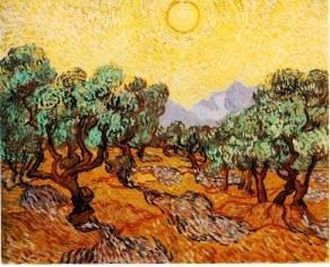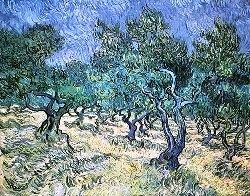
Publisher:
Bonnie King
CONTACT:
Newsroom@Salem-news.com
Advertising:
Adsales@Salem-news.com

~Truth~
~Justice~
~Peace~
TJP
Nov-03-2013 01:54

 TweetFollow @OregonNews
TweetFollow @OregonNews
The Olive Tree
Dr. Paul Balles Salem-News.comThe still slow life is mine, my days are years.
Tied to the soil, I reach towards the sky,
as men rush by, so driven by their fears,
and with their fears intact pass on and die.
From Plato's Olive Tree
 Vincent van Gogh's Olive Trees with Yellow Sky and Sun |
(MANAMA, Bahrain) - This is the olive picking season. Like other harvests, it should be a season of joy. However, the land-grabbing occupiers of Palestine have imbued Israeli youth with the destructive arrogance of conceited, swaggering, self-loving Jews.

“A group of extremist Israeli settlers set ablaze more than 350 Palestinian olive trees” reports the International Middle East Media Centre. (Sept. 23, 2013) “Extremists further attacked a Palestinian orchard, south of Nablus, and uprooted its trees.”
According to the Palestine News Agency (WAFA), “Israeli settlers Monday (Oct.14, 2013) cut down olive trees in the village of Ras Karkar, west of Ramallah....Settlers always attack villages during the olive picking season and destroy olive trees to harm the local Palestinian population who live from harvesting olive crops.”
Noam Chomsky observes, “The result, predictably, has been severe disruption of Palestinian lives, and according to UN reports, a decrease of more than 80% in number of farmers who routinely cultivate their lands and a decline of 60% in yield of olive trees, among other harmful effects.”
Local human rights groups allege that more than 800,000 olive trees have been uprooted since Israel occupied the West Bank in 1967.
“The ancient olive trees are regarded by Palestinians as a symbol of their connection to the land,” reports Al-Jazeera. “Each year during the olive harvesting season, such incidents spike across the West Bank – where more than 515,000 Israelis occupy over 125 settlements, considered illegal under international law.”
Oxfam confirmed in a report that “Olives are the area’s most important crop, whose oil is exported around the globe and whose annual harvest is a crucial source of income for about 100,000 farming families. Olive cultivation contributes up to $100 million in income for some of the poorest Palestinian communities.”
According to Palestinian Central Bureau of Statistics, 80,000 Palestinian families depend on olives as a sole source of income, which constitutes 14% of the Palestinian agricultural output.
“In the village of Burin on Sunday, 20/10, Palestinian olive pickers and Israeli volunteers were attacked by masked settlers,” says 925 Magazine.
“Olive trees are a Palestinian national symbol, a fact acknowledged by Israeli settlers who continually seek to destroy them,” writes Daoud Kuttab.
The story of Palestine in the olive tree deserves to be heard.
The Story of Palestine
- By Anonymous
- If olive trees could speak, what would they tell us?
- Would they recount the glories witnessed in this hallowed place?
- Would they tell of the horrors that transpired long ago in the name of many things?
- Would they recall the small human lives that lived for generations in pastoral dignity?
- Would they give evidence of the suffering and abuse inflicted by mechanical monsters and ill-inspired men?
- Would they share the love they have received from the once young and now old who tended them?
- Would they boast of the healing, the wealth and the comfort they bring?
- Would they complain of the loneliness of the field and the neglect of the world?
- Would they speak of the hope and courage that lives in the earth and endures in the souls of their children?
The olive trees speak all this and more to people who are ready to hear.
Concludes Mahmud Darwish, “If the Olive Trees knew the hands that planted them, Their Oil would become Tears.”

Throughout his life as an educator, Dr. Paul J. Balles, a retired American university professor and freelance writer, has lived and worked in the Middle East for 40 years - first as an English professor (Universities of Kuwait and Bahrain), and for the past ten years as a writer, editor and editorial consultant.
He’s a weekly Op-Ed columnist for the GULF DAILY NEWS . Dr. Balles is also Editorial Consultant for Red House Marketing and a regular contributor to Bahrain This Month. He writes a weekly op-ed column for Akbar Al Khaleej (Arabic). He has also edited seven websites, including bahrainthismonth.com, womenthismonth.com
Paul has had more than 350 articles published, focusing on companies, personality profiles, entrpreneurs, women achievers, journalists and the media, the Middle East, American politics, the Internet and the Web, consumer reports, Arabs, diplomats, dining out and travel. Paul's articles on Salem-News.com are frank and enlightening. We are very appreciative of the incredible writings Dr. Balles has generated for our readers over the years, and we are very pleased to list him among our most valued contributors.
Indulging the hard subjects that keep the world divided is our specialty at Salem-News.com, and with writers like Dr. Paul Balles on our team, we amplify our ability to meet challenges and someday, will see the effects of this exist in context with a more peaceful and generally successful world.
 |
 |
 |
Articles for November 2, 2013 | Articles for November 3, 2013 | Articles for November 3, 2013



Quick Links
DINING
Willamette UniversityGoudy Commons Cafe
Dine on the Queen
Willamette Queen Sternwheeler
MUST SEE SALEM
Oregon Capitol ToursCapitol History Gateway
Willamette River Ride
Willamette Queen Sternwheeler
Historic Home Tours:
Deepwood Museum
The Bush House
Gaiety Hollow Garden
AUCTIONS - APPRAISALS
Auction Masters & AppraisalsCONSTRUCTION SERVICES
Roofing and ContractingSheridan, Ore.
ONLINE SHOPPING
Special Occasion DressesAdvertise with Salem-News
Contact:AdSales@Salem-News.com
Salem-News.com:
Terms of Service | Privacy Policy
All comments and messages are approved by people and self promotional links or unacceptable comments are denied.
[Return to Top]
©2026 Salem-News.com. All opinions expressed in this article are those of the author and do not necessarily reflect those of Salem-News.com.